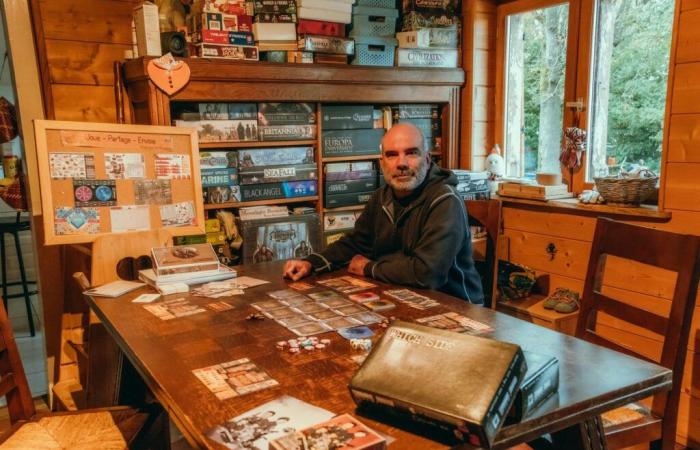
The comfort of Alexandre Weiss's home is deceptive. At the heart of this typical Sort-en-Chalosse residence, ideas abound and their profitability is precarious. Near the chickens and the vegetable garden, this forty-year-old runs the company Yeast Games. An initially associative project perpetuated with four associates, including his partner, Gabriela Escarcia, who “always says that she has nothing to do with it because she doesn't like the light”.
Games on postcards, board games, investigation evenings: each creation has its own universe. The SAS created in 2021 offers a mix of genres, between local particularities, history and worlds sometimes steampunk, grunge or even medieval fantasy, in line with the first love of its creators: life-size role-playing games.
A kid from Heugas, good at school, but “rather a rebel with long hair who drinks beers in the forest” during his high school years, Alexandre Weiss admits: “Fortunately there was the club of role play in Dax. »
No smoke without play
As a child, solitude became the fuel for his imagination: “I had time and we didn't have a lot of money. I remember that a game was offered in two copies of “Casus Belli”, a specialist magazine. I managed to get the first part, I never got the second, so I built the other half of the game. I had drawn a map by hand on cork, with pins, I I embodied factions of the Diadochi (at the death of Alexander the Great in 323 BC, Editor's note), I played against myself with half-invented rules. »
The big story joins that of Alexandre Weiss. His period in a truck in Romania, in the vestiges of communism, his trips to Mexico with Emiliano Zapata and his partner, interspersed with history studies by correspondence, ended up shaping the spirit of his games, including the scenarios are mainly co-written with his childhood friend and Heugas, Franck Catoire.
For three years, their company has been a rarity in the Landes, it also stands out for its premise. The latest production is a unique board game: “Trappist monks brew beer on full moon nights because they hunt werewolves (there is also a wereduck, Editor’s note) to put him in their beer. » Like the two previous creations of this type, Moonlight Brewers aims to be particularly virtuous: “We produce games without plastic, advocates Alexandre Weiss. Local jurisdiction is sought, but when I talk about local, I mean close to home. We pack our boxes in Tarnos, we go to Barrouillet in Dax for the cards. And this year, a breakthrough: we will be able to do the cutting ourselves. » The tokens will also be capsules (beer required) collected by a partner brewer.
But certain particularities have a price: “17 euros production cost for a box, we sell the game for 35 euros. We made a quote in China for fun, it's 4 euros delivered, customs cleared. The problem, nuance Alexandre Weiss, is that I do not want to exploit people who work 55 hours a week at €1.50 an hour and with only eight days of vacation per year maximum. My conscience forbids me. »
Despite its small box, the Moonlight Brewers game “takes up space” once unfolded.
Amaury Dollez
A form of activism
A supporter of crowdfunding, Yeast Games is not yet sure if it will one day soon offer Moonlight Brewers for sale. “Board gaming is a competitive environment, big companies, big publishers who have lots of money, flood crowdfunding platforms and social networks with sponsorship. Where we had visibility on the first two games, today, it's as if we didn't exist. »
A fight begins to bring together the missing thirty contributors but Alexandre Weiss knows a thing or two about fighting. This doctor in contemporary history, specialist in the daily life of anarchist and syndicalist militancy in Mexico and the United States during the beginning of the last century, even poured a little of his thesis into the first game from Yeast Games.
“Which side are you on?” » is a game of placing pawns, with cards, where the participants embody immigrant workers in New York in 1911. “A totally cooperative game, certainly based on the anarchist and syndicalist programs of the time – which advocates a free commune in New York – but whose purpose is not historical. It’s a realistic uchrony, adds its co-creator. We start from historical immersion towards the game.” And without any propaganda. “We don't make big speeches, we put things down and let the players grasp them. In any case, we are not going to change the world with three games in Sort-en-Chalosse. » There needs to be a starting point.
Version anti-gaspi
Yeast Games' first game, “Which side are you on?” », was released in 500 copies, half of which were in an anti-waste version. A neophyte when it was created, the Chalosse team learned on the job and not without a hitch. Colorimetry problem, characters too large, there were nearly 90,000 cards to throw away, to the great dismay of “certain green contributors”. “So this year, after a little time left to sell off stocks, we released a version with these printing defects, which in no way affect the possibility of playing,” says Alexandre Weiss. In this sense, Yeast Games adapts to demand to print its game copies. Its greatest success: Bonnie and Clyde (1,000 prints).





